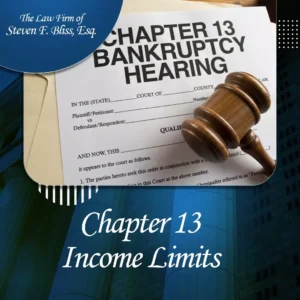What is Chapter 13 bankruptcy?
Chapter 13 Bankruptcy Income Limitations.
Listen to this Article on:
Chapter thirteen bankruptcy income limits and means requirements.
Chapter 13 Rules: Many people choose Chapter 13 because their income is too high and cannot pass the “means test” for Chapter 7 bankruptcy. What is Chapter 13 bankruptcy? Chapter 13 bankruptcy is a form of bankruptcy that allows a person to reorganize his financial situation. Those who file for Chapter 13 keep their property and assets, but a debt repayment plan is created to repay the secured debts such as cars, furniture, or catch-up house payments, usually at a lower payment schedule. The repayment plan lasts 3 – 5 years, intending to discharge unsecured debts upon completion of plan payments, but their obligations are not entirely forgiven in Chapter 7 bankruptcy. Instead, filers pay back a portion of their debts (generally secured debts) over a three- to five-year period, after which the rest of their unsecured debt will be wiped out.

Seeing an increasing wave of bankruptcies before the housing crisis, the banks needed more protection. Consequently, when Congress overhauled the bankruptcy laws in 2005, there was much controversy over the “means test.” The good news is that if you plan to file for Chapter 13 bankruptcy, the means test has no bearing on your ability to do so. Accordingly, the means test is used only to weed out some folks from Chapter 7 bankruptcy eligibility.
However, there are other eligibility criteria for Chapter 13 bankruptcy. And if you file for Chapter 13, you will have to go through an income test (similar to the means test) to determine how long your Chapter 13 repayment plan will last.
Please Help Us Spread The Word By Giving Us a 5 Star Rating on This Article
Free Initial Consultation with
Steven F. Bliss Esq.

★ ★ ★ ★ ★

The Means Test for Chapter 7 Bankruptcy
The means test in Chapter 7 bankruptcy determines if you have enough income to repay some of your debts through a Chapter 13 bankruptcy repayment plan. (To learn about repayment plans, see The Chapter 13 Bankruptcy Repayment Plan.)
Moreover, if your income is higher than the median income in your state, you must take the means test. The means test compares your income to certain expenses and deductions. If you “fail” the means test (meaning you have more revenue than the law allows), your Chapter 7 filing is presumed to be an abuse, and absent facts proving the contrary, you will be barred from filing for Chapter 7. For most debtors, that means filing for Chapter 13.
Requirements to File for Chapter 13 Bankruptcy
When you file for Chapter 13 bankruptcy, there is no “means test” to determine whether your income is too high. Conversely, opposite forces are at work in Chapter 13 – if your income is so low that you cannot fund a repayment plan, you won’t be eligible for Chapter 13.
Notwithstanding, there are other limits on who can file for Chapter 13 bankruptcy. For example, only consumers (not businesses) can file for Chapter 13. In addition, your secured debts cannot exceed $1,184,200, and your unsecured debts cannot exceed $394,725. Nonetheless, you must be able to propose a repayment plan that pays off all required debts. (To learn which debts must be paid in full, in part, and how much your monthly repayment will be in Chapter 13, see How to Calculate a Chapter 13 Monthly Payment.)
Why Your Income Is Important In Chapter 13
Although your income won’t preclude you from filing for Chapter 13 bankruptcy, your “disposable income” does play a role in how long your repayment plan will last. If your income is less than your state’s median income, your repayment plan will probably last only three years. If your income is more significant than your state’s median income, your repayment plan will likely have to extend to five years – which means you’ll repay a more considerable portion of your debts.
